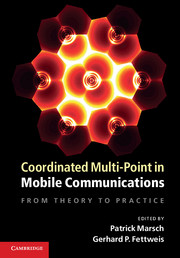Book contents
- Frontmatter
- Contents
- List of Contributors
- Acknowledgements
- List of Abbreviations
- Nomenclature and Notation
- Part I Motivation and Basics
- Part II Practical CoMP Schemes
- Part III Challenges Connected to CoMP
- 7 Clustering
- 8 Synchronization
- 9 Channel Knowledge
- 10 Efficient and Robust Algorithm Implementation
- 11 Scheduling, Signaling and Adaptive Usage of CoMP
- 12 Backhaul
- Part IV Performance Assessment
- Part V Outlook and Conclusions
- References
- Index
11 - Scheduling, Signaling and Adaptive Usage of CoMP
from Part III - Challenges Connected to CoMP
Published online by Cambridge University Press: 05 August 2012
- Frontmatter
- Contents
- List of Contributors
- Acknowledgements
- List of Abbreviations
- Nomenclature and Notation
- Part I Motivation and Basics
- Part II Practical CoMP Schemes
- Part III Challenges Connected to CoMP
- 7 Clustering
- 8 Synchronization
- 9 Channel Knowledge
- 10 Efficient and Robust Algorithm Implementation
- 11 Scheduling, Signaling and Adaptive Usage of CoMP
- 12 Backhaul
- Part IV Performance Assessment
- Part V Outlook and Conclusions
- References
- Index
Summary
In this chapter, we address how CoMP can be applied selectively and adaptively to well-chosen sets of terminals in a mobile communications system. While Section 11.1 focuses on scheduling approaches, where a central scheduling unit performs multi-cell resource allocation in the context of non-cooperative or joint transmission in a cellular downlink, Section 11.2 looks into radio link control and signalling aspects connected to establishing CoMP on-demand. Finally, Section 11.3 ventures into the field of ad-hoc CoMP, where cooperation is established flexibly after uplink transmission has already taken place.
Centralized Scheduling for CoMP
In this section, we discuss centralized multi-cell scheduling for a system using either non-cooperative transmission or joint transmission in the downlink. After Subsection 11.1.1 motivates the topic, Subsection 11.1.2 presents the studied scenario and its main models. Subsection 11.1.3 introduces some relevant scheduling problems, where the aim is to maximize system throughput. Subsection 11.1.4 analyzes the problems introduced earlier through system level simulations. Finally, Subsection 11.1.5 adds some final remarks on the problem of centralized scheduling and its extension to uplink scenarios.
Introduction
In previous chapters, we have typically observed transmissions between multiple base stations (BSs) and user equipments (UEs) on a single orthogonal frequency division multiplex (OFDM) sub-carrier, assuming that the assignment of system resources to the communicating entities has already taken place.
Information
- Type
- Chapter
- Information
- Coordinated Multi-Point in Mobile CommunicationsFrom Theory to Practice, pp. 243 - 276Publisher: Cambridge University PressPrint publication year: 2011
